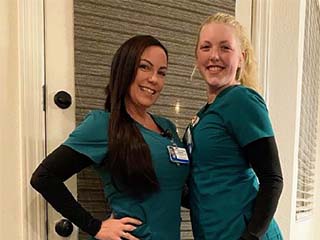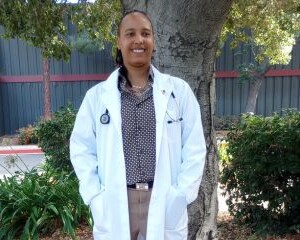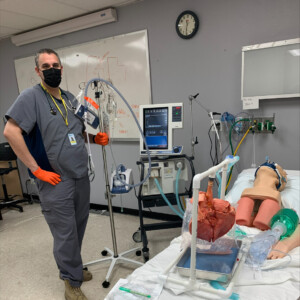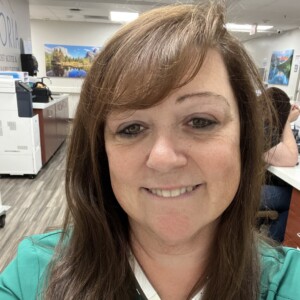Katrina and Taylor Johnson, Respiratory Care Graduates Helping Patients Breathe
 Katrina Johnson decided to make a career change after working in real estate for 17 years; she decided to become a respiratory therapist. Two years later, her daughter Taylor—newly graduated from high school—followed in her footsteps. Both mother and daughter have found Respiratory Therapy to be a full, rewarding career, and as proven during Covid-19, one that can test your mettle and your heart.
Katrina Johnson decided to make a career change after working in real estate for 17 years; she decided to become a respiratory therapist. Two years later, her daughter Taylor—newly graduated from high school—followed in her footsteps. Both mother and daughter have found Respiratory Therapy to be a full, rewarding career, and as proven during Covid-19, one that can test your mettle and your heart.
Katrina’s interest in respiratory therapy was piqued when her uncle, a respiratory therapist, would talk about his job. Katrina also wanted to be able to take care of her mother, who had Bronchiectasis. After doing some research on different programs, she decided on the Respiratory Care program at Carrington College Phoenix. She loved her time there.
“The support system in this program was phenomenal,” Katrina says. “Because I was coming from a real estate background, studying something so completely new to me was a shock, but the instructors made it understandable and achievable. I fell in love with it.”
Katrina found chemistry to be the most challenging part of the program for her, but the labs and the teaching support really helped her through. She did her externship in several different hospitals, on general floor rotation, ICU, and NICU.
“I loved the clinical hours, the idea of hands-on with patients, charting, and care,” she says. “It’s one thing to learn from or look at something in a book, but another to see how it is with the patients.”
Katrina now works at Banner Del Webb Medical Center as a Vascular Access RT, a specialty she’d been interested in since her clinical rotations, where she was able to shadow the vascular team.
While Katrina attended the Respiratory Care program, graduated, and began working, her daughter, Taylor, finished high school. Taylor loved hearing about her mom’s job and was fascinated with respiratory care. Soon she enrolled in the same program; the teachers welcomed her with open arms.
“The instructors had already heard all about Taylor from me,” Katrina says, laughing. “And I think they gave her a bit of a hard time because they knew me.”
When asked if her mom helped her study, Taylor answers with a good-natured, defiant, “No!”
“Well,” she clarifies, “Toward the end, my mom helped me with some things. But I was stubborn and wanted to do it my own way—and on my own.”
Taylor’s favorite part of the program was her clinical hours, which she did at the county hospital.
“I loved being able to apply my knowledge in the real world,” she says.
Taylor now works at Banner Thunderbird Medical Center in Glendale, in the ICU, also doing SWAT for traumas, critical rescues, and codes.
Being a Respiratory Therapist during Covid-19
The arrival of Covid-19 impacted Katrina’s and Taylor’s jobs in every way.
“It was a very hard, very fast learning curve,” Katrina remembers. “Our typical vent settings and the ways we would typically manage a patient weren’t necessarily working with Covid, so we had to learn to adapt for each patient.”
Trying to help so many people with Covid—who sometimes could not recover—took an emotional toll on Katrina and Taylor.
“For many of these patients there was nothing we could do,” Katrina says. “We were often almost to the point of tears. For the patients who passed away, it was a long struggle and a disappointing defeat. For those who survived, we knew they would have a long, hard recovery.”
Dealing with the devastation of Covid made both women long for the “normal” diseases, COPD, and traumas—but they believe it also made them better therapists.
“I already know where to start now [with a Covid patient],” Katrina says, “And I can correct things faster and sooner.”
Katrina realized early on that she had to compartmentalize her feelings to protect herself when she lost a patient; it was something she helped Taylor come to terms with. There were times when Taylor would come to her mother after work, to decompress and grieve.
“I was doing a lot of the same things my mom was doing at my hospital,” says Taylor. “With generally the same outcome.”
“You have to try to find a way to connect with patients without getting too close,” Katrina says, “But it’s hard to give patients appropriate care, see them day after day, talk to them, and yet somehow not get too emotionally invested.”
Covid was—and is—a challenging time for Katrina and Taylor, and they are grateful for the support they received from both their hospital teams and from Carrington.
Katrina and Taylor want to recognize the dedication, support, and excellence of their instructors, Steve Habertee and Tracy Cagan, both of whom they have kept in touch with.
“Steve holds his students accountable; he wanted you to succeed—but he didn’t let you slack, and he pushed you to be the best you could be,” Katrina says. “Tracy, the program director, was also incredible. I even reached out to her in the beginning of the pandemic to ask what else I could do to help my Covid patients.”
What would Katrina and Taylor want to tell someone who is thinking about—or just beginning—the Respiratory Care program?
“I would suggest Carrington because of the incredible support,” Katrina says.
“Take full advantage of the support,” Taylor agrees. “Come in for the clinical hours. And don’t be afraid to ask questions. They are right on top of it—they are more than willing to help.”


